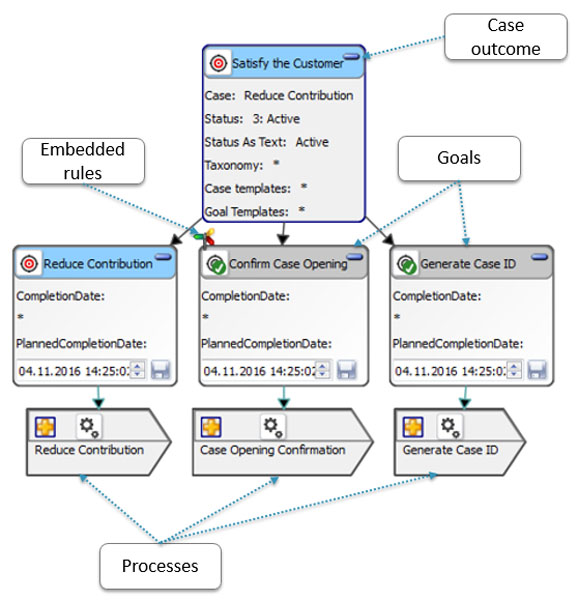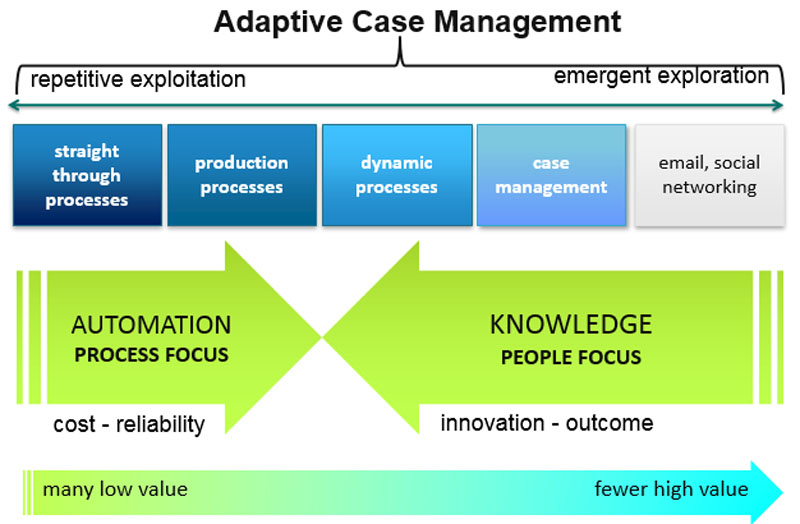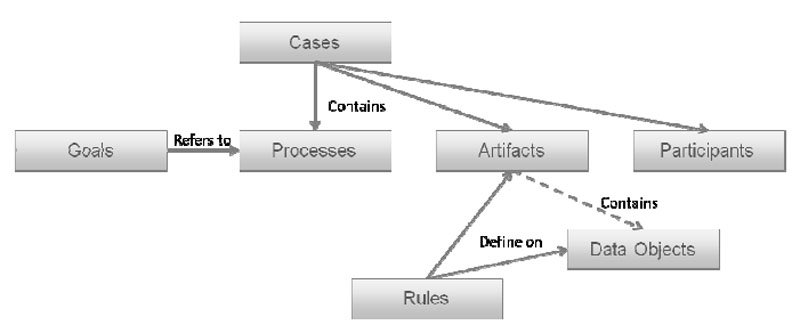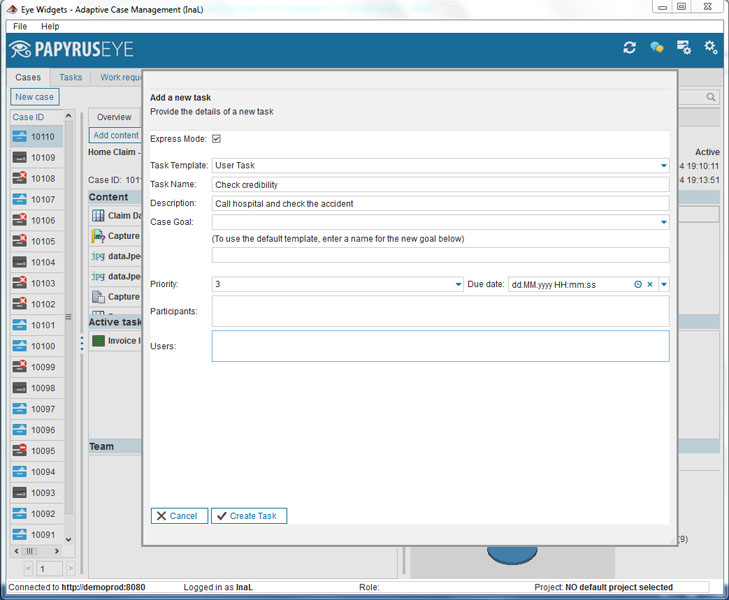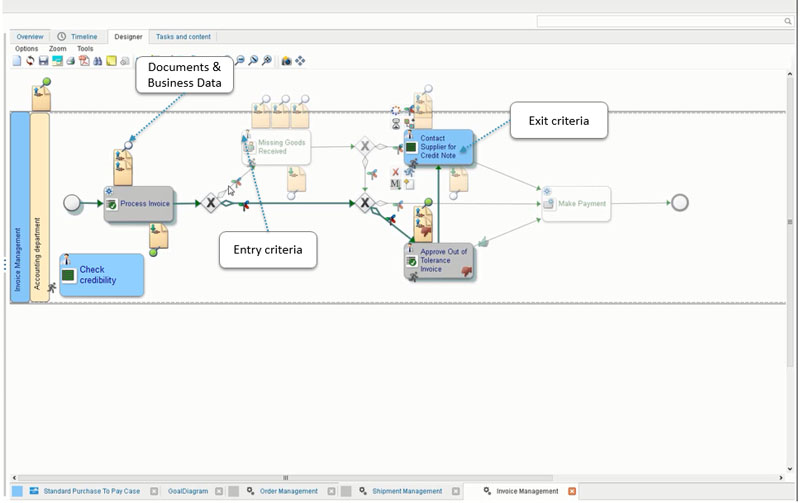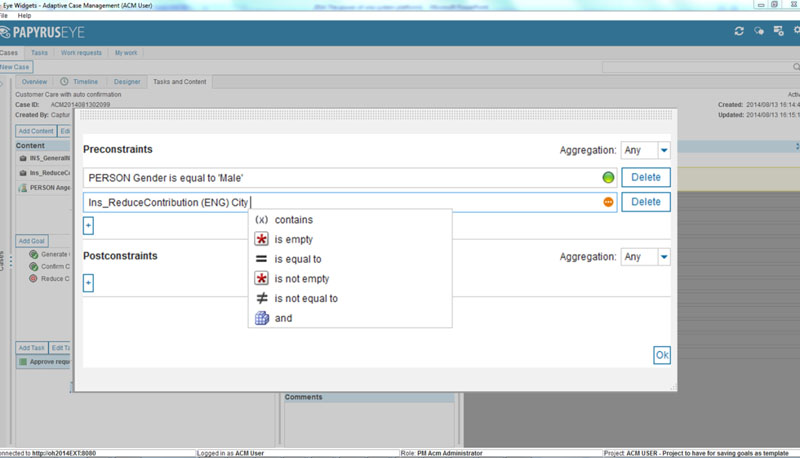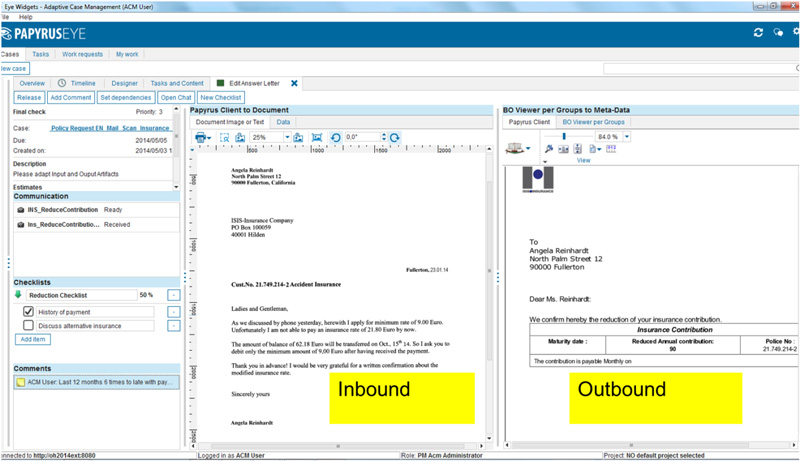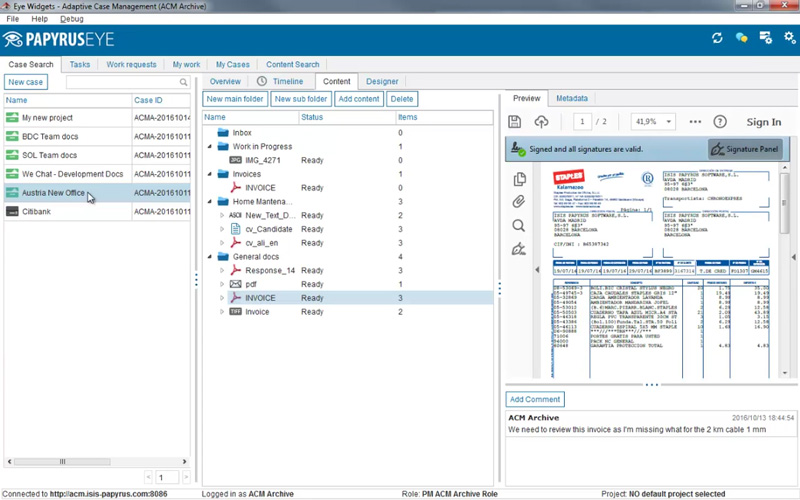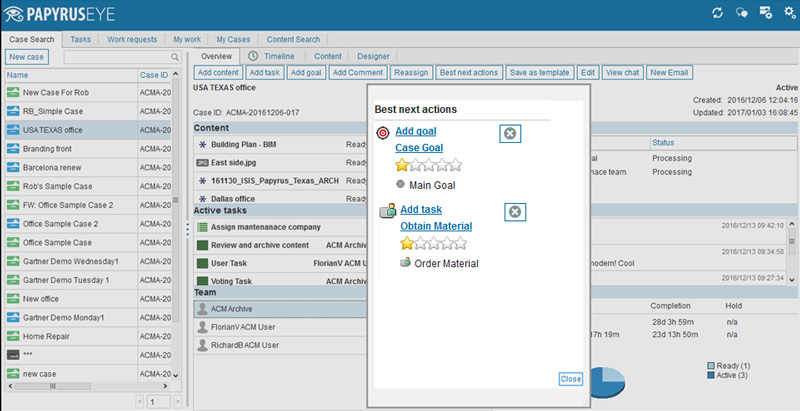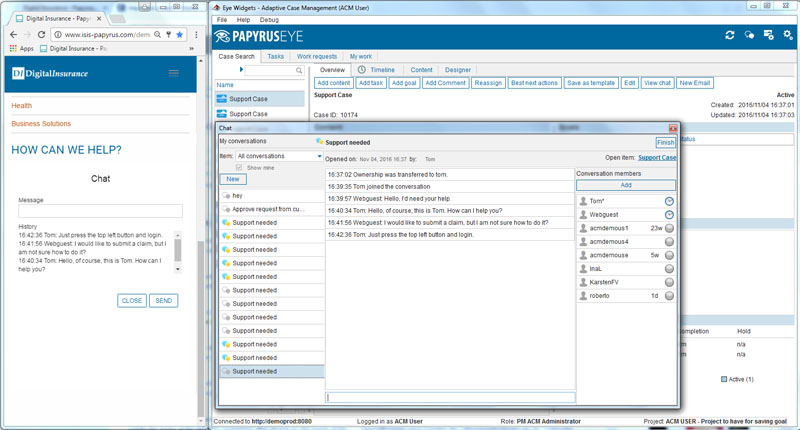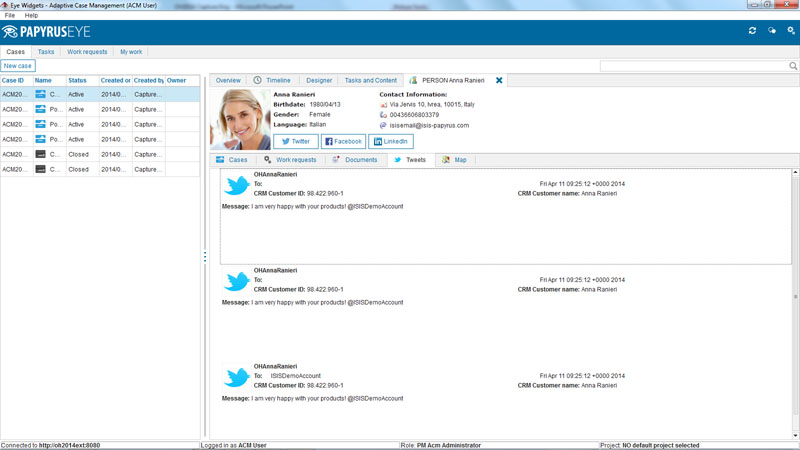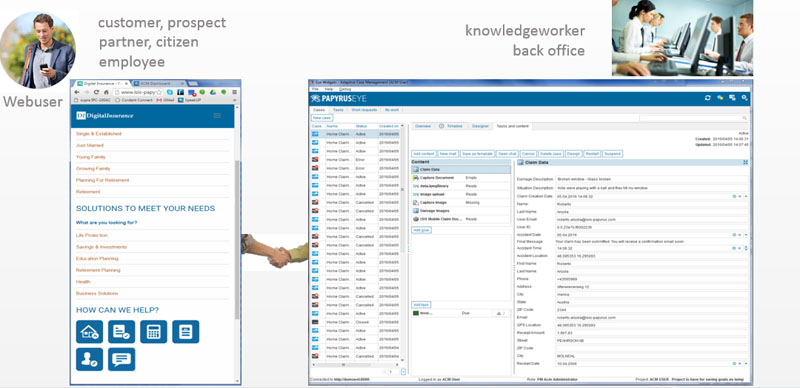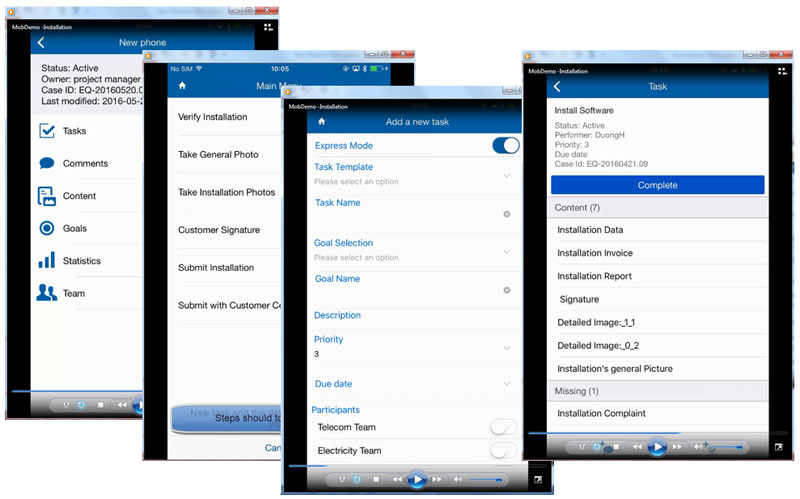Empowering Knowledge Workers
Knowledge workers are found at the heart of every service- and customer-focused operation and their critical contributions are linked directly with business innovation.
Typical knowledge work includes strategic planning, patient care, and communication-intensive, event-driven activities, such as customer onboarding, contract management, customer claims management, and purchase-to-pay, as well as legal, investigative and analytic work, and fraud investigations.
Cross Industry |
Healthcare |
Insurance |
Financials |
Public Sector |
|
|
|
|
|
Knowledge work is mostly
UNSTRUCTURED and UNPREDICTIBLE
The primary purpose of knowledge work involves "non-routine" problem-solving and the creation, distribution and application of information. When dealing with different case contexts and event-driven processing, knowledge workers do not always follow the same process path.
Rather, they perform situational assessments using all available static and dynamic information and communicate interactively within the organization and with clients, in order to make competent decisions, which in turn determine the actual process execution path. Business process execution always drives toward the outcome but may involve a number of different routes, options and alternatives, many of which have not been defined in advance.
Knowledge work is CASE-ORIENTED
rather than transactional
According to Gartner, transactional business processing has been outpaced by case management solutions that are increasingly used to enhance knowledge worker productivity, provide transparency for case settlement decisions, improve compliance, facilitate collaboration among caseworkers, better coordinate information flows and provide better monitoring of case status.
A “Case” is a project or a service that is “opened”, and processed over a period of time to achieve resolution of a request, problem, claim or any other type of complex activity before being “closed” again.
Such cases can be, for example, a patient record, a lawsuit, an insurance claim, or a contract, and may involve different groups of people inside and outside of an organization who typically use diverse communication channels to effectively communicate and collaborate. The case itself should contain all relevant documents, customer data and communications, case evidence data, policies, rules, and other information needed to successfully process and manage the case for the case resolution, as well as for audit and compliance purposes.
Goal orientation
As within knowledge work it is often not possible to follow predefined flows, case processing requires clearly defined goals, authority assigned to performers, and means to achieve the case goals.
Giving knowledge workers the power to create and execute exactly what they need to achieve the goals and the best possible case outcome is of critical importance for the success and growth of any business – and usually for the satisfaction of its customers.
Papyrus Adaptive Case Management
Papyrus ACM provides the business case management functionality for all types of processes in one environment and enables corporate management to communicate business strategy to diverse departments in a uniform way, based on one single model.
Giving knowledge workers the power to create and execute exactly what they need to achieve the goals and the best possible case outcome is of critical importance for the success and growth of any business – and usually for the satisfaction of its customers.
Empowerment of Business Users
Papyrus ACM is designed as an empowerment technology for organizations to selectively and securely empower non-technical knowledge workers to interact with all process artifacts in real time and create processes with any sequence and structure interactively, on the fly. Effectiveness and transparency are achieved by linking customers and process performers in the context of the business process.
With Papyrus, knowledge workers can design communication and create and modify customer interactions, as well as manage business rules and adaptive processes, and freely interact with process artifacts to dynamically change content, processes and rules at process execution time to achieve the optimal customer experience and business outcomes.
The assembly and modification of running processes is supported with ready-to-use reusable templates for all relevant elements of a business case (case, goal, process, participant, artifact, etc.) that can be easily selected, simply customized and used by the business user in an individual case without technical skills.
Design-by-Doing
Newly created and modified processes are immediately executable without the time-consuming step of translation of the process model into the executable process code, which leads to considerably increased efficiency.
Running processes can be modified by non-technical business users ”on-the-fly“ at the process execution time to adapt to the requirements of the specific business situation as needed.
The corresponding graphical BPMN notation with all the decision process steps and process modifications is automatically charted in the background, and can be subsequently saved as a template to be used in similar business situations. This approach is called "Design-by-Doing".
The knowledge from execution is fed back into the process and case templates. This way, many non-cost-intensive process improvements are consequently and automatically implemented in accordance with the business strategy during normal day-to-day work, rather than through programmed, add-on functions or workarounds.
Embedded Natural Language Rules (NLR) Engine
Knowledge workers can define business rules simply by using system suggestions and entering everyday language terms, which are automatically checked on syntax, logic and data validity and can be presented and processed in multiple languages based on one definition. Business rules have an effect on events, goals, sub-processes, tasks and state transitions in a process and determine the overall business case and process execution.
Access to relevant Data and Content
Real-time access to all content, documents and data required in the context of a specific business case is provided for case workers using Papyrus to quickly make qualified decisions and communicate these to their co-workers and customers.
Artificial Intelligence Mentoring System
An innovative pattern-matching technology, modeled after human learning - the Papyrus User-Trained Agent (UTA) - provides a powerful mentoring system for knowledge-workers to assist in decision-making. The UTA intuitively learns from actions performed by business users through pattern recognition on data objects and their relationships across business cases, and can effectively suggest appropriate actions in given situations by analyzing relevant elements, actively supporting business users in making autonomous decisions.
Digital Collaboration
The ACM Workplace supports digital collaboration with an integrated chat and commenting functionality for business users to consult their co-workers, and to discuss case-related matters, as well as interact directly with customers. Dynamic inclusion of general Web content and social network services allows for rich Web apps, video chat, wikis, blogging and social interaction with co-workers, all under the control of role/policy authorization provided by the Papyrus Platform and in the context of the business case. The entire communication is saved and becomes a part of the business case.
Full integration with Front Office
Using the Papyrus Online Channel, the ACM business services can easily integrate with the company’s website and run on mobile devices, while linking in real time to clients and customer on the front end, while working as an integrated part of the whole Papyrus Omni Channel network.
Knowledge workers on a customer case can effectively follow the case, track the content, connect to backend services, collaborate, and interact with the customer in context directly from the back office via the same Case Management system.
Accessible everywhere – PC, Tablet and Mobile
The ACM user interface is based on the flexible Papyrus EYE Widgets technology for ubiquitous availability on Desktop and in the Browser, as well as via Mobile interface, to enable customers to set up and customize the way they interact with the system to exactly match their needs.
Papyrus Adaptive Case Management:
Advantages for the Knowledge Worker
To fully empower knowledge workers, Papyrus provides advanced case management technology that offers a comprehensive, high-value package of business benefits and user features. By combining content, data and process IN ONE and providing executable configurable components with powerful visual means to ensure the business and communications flexibility for knowledge workers, Adaptive Case Management enables on-the-fly learning and exceptions alongside role-based content control and collaboration.
This makes Papyrus ACM an ideal platform for unique, skill- or knowledge-intensive processes and gives business users the power to perform emergent or unstructured knowledge work and create exactly what they need, when they need, to achieve the best possible process outcome.
Unique Benefits of Papyrus ACM:
- Empowers non-technical business users
- Builds virtual process organizations
- Users create dynamic knowledge processes
- Assembles optimized process templates
- Delivers real-time customer perceptions
- Gathers actionable process knowledge
- Links business and process goals
- Provides operational transparency
Unique Features of Papyrus ACM:
- Consolidates 5 elements: Data, Activities, Content, Goals/Rules, GUI
- Adapts the process in real time – Design-by-Doing
- Embeds all decision-relevant data
- Users define business rules at run time - Natural Language Rule Editor
- Add new actors and tasks, as needed
- Actors receive recommendations by the User Trained Agent
- Alternative decisions by actors are audited
- No restriction in execution – calling Web services, human workflow with automated workflow, task execution/letter writing, job management, etc.
- Inbound content classified, data extracted and validated at point of entry
- Embedded security on the object and function levels

